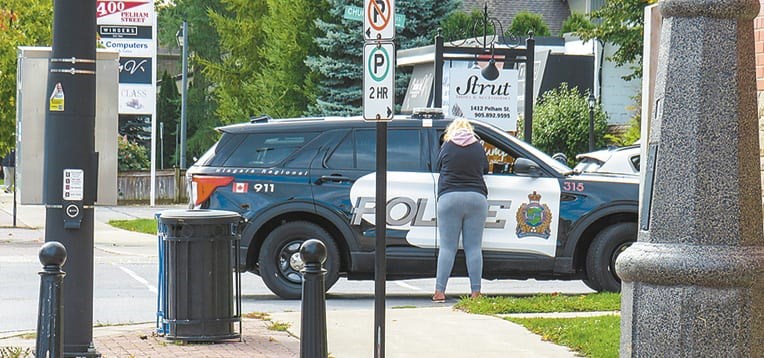A woman frequently seen panhandling in downtown Fonthill has raised the concern of some, although not necessarily from a nuisance perspective.
“I’m concerned for her safety,” Jennifer Morrison told the Voice recently. Morrison operates Believe Hair by Jenn, at 1415 Pelham Street, near where the blonde woman is often seen asking business owners and passersby for money, while occasionally walking into traffic. Morrison says she has developed a relationship with the woman, whom Morrison says has a troubled past, is about 35 years old, and lives on nearby Church Hill. Her concern is exacerbated by what the woman may be spending the money on that she’s given.
“People need to stop giving her money,” Morrison said. “I think we need compassion, but it doesn’t help when people are giving her ten, twenty dollars.”
On at least one occasion, the woman has been seen speaking to police, but such acts of panhandling rarely result in arrest in any jurisdiction.
“Other businesses have given her food, but then she will stand out front and panhandle,” Morrison added. “So, some have gotten stern with her.”
I think we need compassion, but it doesn’t help when people are giving her ten, twenty dollars
Pelham’s chief bylaw enforcement officer and Fire Chief Bob Lymburner, urged compassion when encountering panhandlers. “We do have a [nuisance bylaw] which speaks to loitering and soliciting,” Lymburner said. “In most cases when dealing with persons who panhandle, solicit, loiter etc., there is a degree of mental health issues and in most incidents these persons are totally harmless. As a society, we do a real poor job on helping and dealing with mental health. These people who suffer in varying degrees are usually shoved out into the street, in large part ignored by family members and left to fend for themselves.”
Approached by the Voice, the woman declined to give her name or speak about her situation.
The Voice reached out to two mental health organizations for comment— Niagara Health, and the Centre for Addiction and Mental Health—neither of which acknowledged the request.
“There are a number of agencies who help people with mental health issues, but unfortunately they are underfunded, understaffed and overworked,” Lymburner added.



